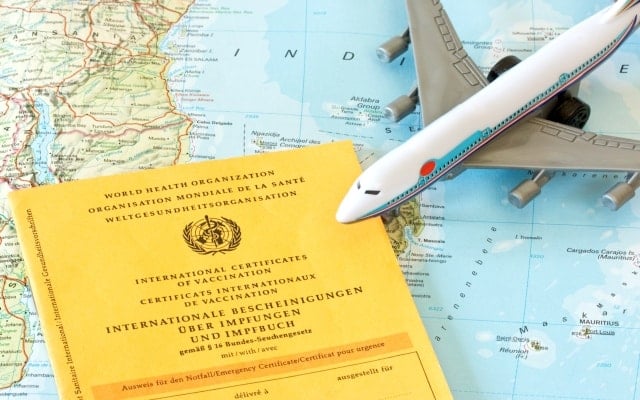Before the vacation comes the vaccination. Getting properly protected for your travels is essential for your safety, and the safety of people at home.
The only thing you want to bring back from your holiday with you is a souvenir.
To make sure you have the right vaccinations for your destination, read on for our guide on getting your holiday vaccinations.

What vaccinations do I need?
Once you’ve booked your travels and you know where you’re going, you can use the NHS’ Fit for Travel page to look up exactly which vaccinations you need.
You should check each time you travel - some vaccines will last years but others you'll need to have again even if you've already had them.
Do I need a vaccine for a layover?
This is a worry for travellers getting a connecting flight, but generally you won’t need to get any extra vaccinations if you’re not planning on leaving the airport.
If you’re unsure about whether you’ll be asked for proof of immunisations, contact your airline to ask them, giving them specific details of where you’re going to and for how long.
If you leave the airport, even just for a few hours on a layover, you should get the jabs needed for that country.
Are travel vaccinations free?
Most travel jabs will be offered for free, but not all are. The NHS provide the following vaccinations free if the clinic or GP is signed up to provide the services:
- Diphtheria, tetanus and polio (combined)
- Hepatitis A
- Cholera
- Typhoid
You’ll have to pay for other vaccinations including:
- Hepatitis B
- Japanese encephalitis
- Meningitis
- Rabies
- Tick-borne encephalitis
- Tuberculosis
- Yellow fever (You can only get these vaccines from designated centres.)
The cost can vary but vaccines will usually be cheaper if you get them through the NHS. You can choose to go to a high-street chemist or private travel clinic, but expect prices to be a bit higher.
When should I get my vaccinations?
It’s best you see your GP or private travel clinic at least 8 weeks before you travel. Some vaccines need to be given well in advance to develop immunity, and some will have to be given in separate doses spread out over a couple of weeks.
Is there a malaria vaccine?
Malaria is is an infectious disease spread by mosquitos that affects humans and other animals. Symptoms typically include fever, tiredness, vomiting, and headaches. In the worst cases it can cause seizures, coma, or death.
There isn't a vaccination against malaria, so you need to be careful if you're travelling to an affected area. Malaria is found in over 100 countries - check the country you're travelling to before you leave so you can prepare.
As well as taking antimalarial tablets – which reduce your risk of infection by up to 90% - the NHS recommends following the ABCD approach.
- Awareness of risk – find out whether you're at risk of getting malaria.
- Bite prevention – avoid mosquito bites by using insect repellent, covering your arms and legs, and using a mosquito net.
- Check whether you need to take malaria prevention tablets – if you do, make sure you take the right antimalarial tablets at the right dose, and finish the course.
- Diagnosis – seek immediate medical advice if you have malaria symptoms, including up to a year after you return from travelling.
Should I be worried about the Zika virus?
With outbreaks in the Asia Pacific region, South and Central America, the Caribbean, Africa, and parts of south and southeast Asia - Zika became a bit of a panic for travellers recently. A list of affected countries can be found online.
Zika is spread by infected mosquitos, and for most people it's a very mild infection and isn't harmful. Symptoms typically include:
- A rash
- A high temperature
- Headaches
- Joint pain (with possible swelling, mainly in the hands and feet)
- Muscle pain
- Conjunctivitis
- Lower back pain
- Pain behind the eyes
Zika mostly poses a risk to pregnant people, or those planning a pregnancy. If you're pregnant (or thinking about being pregnant soon) and planning to travel, ask for advice before you go.
Doctors or travel specialists can give you more specific advice based on your condition and where you're visiting.
I have other health problems. What should I do about my holiday vaccinations?
It is always best to speak to your doctor, especially if you have a pre-existing medical condition. Contact them as early as possible so they can guide you on the vaccinations you’ll need and any implications they can have on your health.
What if I’m travelling last minute?
If you must travel without much advance notice, you still need to have your vaccines. It isn’t ideal, but some vaccines can be given at an accelerated level, meaning you’ll get higher doses done closer together and will still be safe to travel.
If you’re a frequent global traveller, the best bet is to stay on top of your immunisations. Get in touch with your doctor and let them know how frequently you travel and, where possible, the kind of places you visit, so they can ensure you’re adequately prepared if you need to hop on a plane with little notice.
The only time you might have to change your plans is if you’re travelling to a country which requires proof of yellow fever vaccination. Even if you’ve had the injection, the proof is only considered valid 10 days after having the vaccination.
